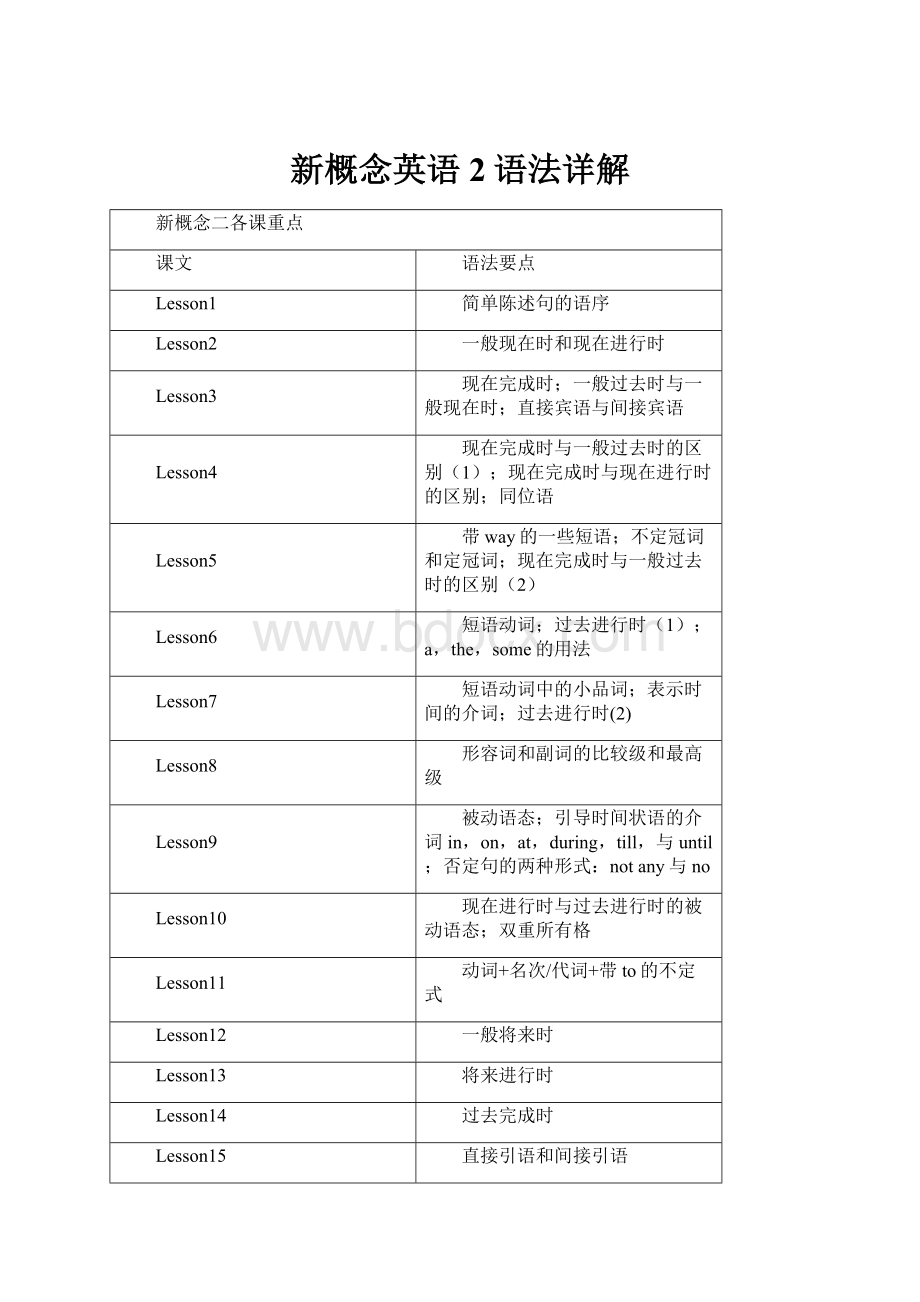 新概念英语2语法详解.docx
新概念英语2语法详解.docx
- 文档编号:24343552
- 上传时间:2023-05-26
- 格式:DOCX
- 页数:55
- 大小:45.17KB
新概念英语2语法详解.docx
《新概念英语2语法详解.docx》由会员分享,可在线阅读,更多相关《新概念英语2语法详解.docx(55页珍藏版)》请在冰豆网上搜索。

新概念英语2语法详解
新概念二各课重点
课文
语法要点
Lesson1
简单陈述句的语序
Lesson2
一般现在时和现在进行时
Lesson3
现在完成时;一般过去时与一般现在时;直接宾语与间接宾语
Lesson4
现在完成时与一般过去时的区别
(1);现在完成时与现在进行时的区别;同位语
Lesson5
带way的一些短语;不定冠词和定冠词;现在完成时与一般过去时的区别
(2)
Lesson6
短语动词;过去进行时
(1);a,the,some的用法
Lesson7
短语动词中的小品词;表示时间的介词;过去进行时
(2)
Lesson8
形容词和副词的比较级和最高级
Lesson9
被动语态;引导时间状语的介词in,on,at,during,till,与until;否定句的两种形式:
notany与no
Lesson10
现在进行时与过去进行时的被动语态;双重所有格
Lesson11
动词+名次/代词+带to的不定式
Lesson12
一般将来时
Lesson13
将来进行时
Lesson14
过去完成时
Lesson15
直接引语和间接引语
Lesson16
条件句
(1)
Lesson17
Must,haveto,与havegotto的用法
Lesson18
实义动词have的用法
Lesson19
表示许可的can和may
Lesson20
介词与动名词
Lesson21
情态动词在被动语态中的应用
Lesson22
一些常见的动词词组
Lesson23
Thereis和itis的用法
Lesson24
无语法重点注重复习
Lesson25
并列句的语序
Lesson26
一般现在时与现在进行时的动词使用
Lesson27
表示过去习惯动作的usedto和一般过去时的特殊用法
Lesson28
现在完成时与since;关系从句及关系代词
Lesson29
现在完成时与一般过去时的区别
Lesson30
定冠词the的用法;some与any的区别
Lesson31
过去进行时与一般过去时;useto的用法
Lesson32
比较结构表示法;Little和few的用法
Lesson33
用于表示目的和方向的介词和副词
Lesson34
被动语态用法补充
Lesson35
复习,本课无新的语法点
Lesson36
Will和begoingto
Lesson37
一般将来完成时;将来完成进行时
Lesson38
过去完成时与从属连词when,before,after,until
Lesson39
间接引语中的say,tell,ask;间接一般疑问句;间接疑问词疑问句
Lesson40
条件句
(2)
Lesson41
Must的用法;haveto的用法;need的用法
Lesson42
Have+名词代替普通动词
Lesson43
Can的用法;beableto的用法
Lesson44
动名词与不定式;介词by与with的用法
Lesson45
被动语态中的by词组的使用
Lesson46
动词与介词to,at,for,with的搭配
Lesson47-48
无新重点内容,加强复习
Lesson49
复合句的语序
Lesson50
动态动词和表态动词
Lesson51
一般过去时
Lesson52
现在完成时和现在完成进行时
Lesson53
一般过去时,现在完成时与现在完成进行时
Lesson54
A与some
Lesson55
Usedto和would
Lesson56
比较结构的修饰语;thesameas的比较结构
Lesson57
用于描写任务的介词in和with;表示地点与位置的介词与副词in,at,off
Lesson58
由get与过去分词构成的被动语态;itissaidthat结构
Lesson59
表示目的的几种方式:
to,inorderto,soasto,sothat,inorderthat
Lesson60
现在进行时表示将要发生的事
Lesson61
Itisthefirsttimethat结构
Lesson62
过去完成时复习;过去完成进行时
Lesson63
祈使句的间接引语
Lesson64
条件句(3)
Lesson65
表示“应该”与“必须”的情态助动词must,haveto,should和oughtto
Lesson66
使役动词have的用法
Lesson67
Can,beableto,和manageto的比较
Lesson68
动词与动名词
Lesson69
被动语态中的动词词组;不定时的被动语态;现在分词的被动语态
Lesson70
形容词后的介词
Lesson71
无新语法重点,复习已讲内容
Lesson72
情态动词must用法复习
新概念语法精粹
GuidetoNewConceptEnglishGrammar
(二册初级班)
第一章英语动词时态
(Tenses)
英语时态是英语语法中的第一道难关,攻下此难关是作文、阅读、口语之关键。
汉语用不同词表达相应时态,而英语用同一词的不同变化形式表达时态。
英语各种时态构成表:
以play为例:
一般时态进行时态完成时态完成进行时态
现在
play
plays
is
amplaying
are
has
haveplayed
has
havebeenplaying
过去
played
was
wereplaying
hadplayed
hadbeenplaying
将来
shall
willplay
shall
willbeplaying
shall
willhaveplayed
shall
willhavebeenplaying
过去
将来
should
wouldplay
should
wouldbeplaying
should
wouldhaveplayed
should
wouldhavebeenplaying
一、一般现在时:
1.构成:
使用动词原形,第三人称单数须有变化。
(1)直接加“s”,works,takes
(2)以辅音加“y”结尾,变“y”为“i”,再加“es”
carry→carries
(3)以“o,s,x,ch,sh”结尾的动词加“es”
goesdresseswatchesbrushes
2.功能:
(1)表现在的事实、状态或动作:
eg:
►.Birdsfly.
►.Shelovesmusic.
►.Mary'sparentsgetupveryearly.
(2)表习惯性动作或职业,常与often,sometimes,usually,always,everyweek,seldom,occasionally,frequently等时间副词连用。
eg:
►.Ialwaystakeawalkaftersupper.
►.Shewritestomeveryoften.
►.Tomandhisgirlfriendgoouttotakeapicnicoccasionally.
(3)表客观真理,格言警句或事实:
►.Theearthmovesroundthesun.
►.Thesunrisesintheeastandsetsinthewest.
►.Twoandtwomakesfour.
►.Nomanbuterrs.人非圣贤,熟能无过。
(4)表将来:
A.在由when,after,before,as,assoonas,although,because,if,evenif,incase,till,until,unless,
solongas,where,whatever,wherever等引导的状语从句中用一般现在时表将来发生的动作。
(黄金重点,所有考试都不放过它!
)
例如:
►.I'lltellherwhenshecomestomorrow.
►.Evenifitrainsthisafternoon,I'llmeetyou.
►.Whateverhappens,youshouldkeepcool-headed.(不错的句型,背下!
!
)
►.I'llberightherewaitingforyouwhereveryougo.(很感人的句型!
)
B.按时间表示将要发生的动作或事件,用一般现在时表达将来时概念。
►.Theplaybeginsat6:
30thisevening.
►.Whendoestheplanetakeoff?
►.Heleavesforthatcitynextweek.
►.Accordingtothetimetable,theexpresstraintoShanghaistartsatnineinthemorning.
(按照时刻表,开往上海的特快列车早上7点出发。
)
测试精编
1.TheBrowns________anicecarandBrown'sbrother________anicejeep.
A.have/haveB.has/hasC.have/hasD.has/have
2.Iftheirhouse________notlikeours,what________itlooklike?
A.is/isB.is/doesC.does/doesD.does/is
3.-________youthinkhewillcome?
-Ifit________tomorrow,hewillnotcome.
A.Do/rainsB.Are/rainsC.Do/willrainD.Are/willrain
4.Thelittlechild________notevenknowthatthemoon________aroundtheearth.
A.do/moveB.do/movesC.does/movesD.did/moved
5.Manyastudent________fondoffilms,butagoodstudentseldom________tothecinema
A.are/goesB.is/goesC.are/goD.is/go
二.现在进行时:
is/am/are+现在分词
1.表示现在正在进行的动作。
如
►.Thekettleisboiling.ShallImaketea?
►.Don'tyouthinkyoueattoomuch?
You'reputtingonweight(体重增加)。
►.Theworkersarebuildinganewbridgeacrosstheriver.
2.表现阶段正进行的动作。
►.Heistakingphysicsthissemester(本学期)。
►.Wearepreparingforourfinalexaminationthisweek.
3.go,come,leave,arrive,land,meet,die,start,return,join,etc.用于进行时态时表示即将开始的动作。
►.Look!
Thebusiscoming.看!
车来了!
►.Theoldmanisseriouslyill,andheisdying.
►.AliceisleavingforBeijingwithhermother.
4.与always,forever,continually,constantly等副词连用,表示说话人带有感情色彩:
赞赏或厌恶。
►.Heisalwaysthinkingofothers.(他总是想着别人。
)
►.Theboyiscontinuallymakingnoises.(这男孩不断地发出吵闹声。
)
►.Theteacherisconstantly(always)criticizingherforbeinglate.(老师一直在批评她迟到。
)
5.下面表示状态、感觉、情绪、精神活动的动词不可用于进行时。
(此条戒律请背10遍!
!
!
)
believe(相信),doubt(怀疑),see(看见),hear(听见),know(知道),understand(理解),belong(属于),think(认为),consider(认为),feel(觉得),look(看起来),seem(看上去),show(显示),mind(介意),have(有),sound(听起来),taste(尝起来),require(要求),possess(拥有),care(关心),like(喜欢),hate(讨厌),love(喜爱),detest(憎恨),desire(意欲)
【简单记忆】:
●永远不要说I'mbelieving...或Heisseeingahouse.再简单一点说,这些动词后面不要随意加-ing.
●可怕的是:
我们在写作及口语中常犯此类大错!
●注意:
haveaparty/thinkabout可以用进行时,因为这里have意为“举行”;think意为“考虑”。
测试精编:
1.Howcanyou________Ifyouarenot________?
A.listening/hearingB.hear/listening
C.belistening/heardD.behearing/listeningto
2.Thegirlevenwon'thaveherlunchbeforeshe________herhomework.
A.willfinishB.isfinishing
C.hadfinishedD.finishes
3.Thosewhohaveappliedforthepost(职位)________intheoffice.(此题超前)
A.arebeinginterviewedB.areinterviewing
C.interviewingD.tobeinterviewing
4.Theoldscientist________todomoreforthecountry.
A.iswishingB.hasbeenwishing
C.wishesD.hasbeenwished
5.Ifhe________,don'twakehimup.
A.stillsleepsB.isstillsleeping
C.stillhasbeensleepingD.willbesleepingstill
三.一般过去时。
定义动词的过去式:
1.表示过去某个特定时间或某一段时间发生的动作或情况。
►.Wevisitedtheschoollastspring.
►.IwenttoschoolbybikewhenIwasinmiddleschool.
►.Chinawasfoundedin1949.
2.在表示时间或条件等的状语从句中代替过去将来时。
(参)
►.Shetoldmethatshewouldnotgowithusifitrainedthenextday.
►.Theywouldnotleaveuntilshecameback.
►.Myfriendpromisedtomarrymeonceshemadeherfinaldecision.
3.一般过去时,现在时和过去时的几组差异:
(别以为这很简单,下面的差异你不一定明白。
)
●Herbrotherwasachemist.(已去世)
●Herbrotherisachemist.(尚健在)
●That'sallIhadtosay.(话已说完)
●That'sallIhavetosay.(言之未尽)
●Itwassonicetoseeyou.(离别时用)
●Itissonicetoseeyou.(见面时用)
●Janedidalotofworkthismorning.(已是当天下午或晚上)
●Janehasdonealotofworkthismorning.(仍是上午)[本句现在完成时,此乃后话!
]
测试精编I:
(用所给动词的正确进态填空)。
1.YesterdayI________(think)thatyouwerenotinBeijing.
2.Aliceusually________(sit)inthefrontoftheclassroom,butshe________(sit)atthebackthismorning.
3.He________(tell)thenewstousthreedaysago.
4.He________(begin)toteachChinesein1990.5.shewouldnottelephonemeifshe________(have)notime.
测试精编II:
1.They________thetripuntiltherainstopped.
A.continuedB.didn'tcontinue
C.hadn'tcontinuedD.wouldcontinue
2.Thelocalpeasantsgavethesoldiersclothesandfoodwithoutwhichthey________ofhungerandcold.(without在这里表条件,你知道吗?
)
A.woulddieB.willdieC.wouldbedeadD.wouldhavedied
3.ItwasnotuntilthenthatIcametoknowthattheearth________aroundthesun.
A.movedB.hasmovedC.willmoveD.moves
4.Whenallthosepresent(到场者)________hebeganhislecture.(重点题)
A.sitB.setC.seatedD.wereseated
5.IfIhadhadtime,Iwouldhavewrittentoyou.ButinfactI________not.
A.haveB.wouldhaveC.hadD.hadhad
四.过去进行时:
were/was+现在分词。
1.表示过去某一时刻或阶段正在发生的动作。
►.Iwasplayingchessat8yesterdayevening.
►.WhenIarrived,theywerewatchingTV.
►.Theyweredoinghouseworkthistimelastweek.
2.用于条件状语从句中表示过去将来进行的动作。
►.Shetoldmetowakehimupifshewassleeping.
►.IaskedmyfriendtowarnmeaboutitaslongasIwasdrivingtoofast.
3.过去某时将发生的事。
可参考—2(4)
►.TheytoldmethattheywereleavingforNewYork.
►.HewasgoingoutwhenIarrived.
测试精编:
1.Mybrother________whilehe________hisbicycleandhurthimself.
A.fell/wasridingB.feel/wereriding
C.hadfallen/rodeD.hadfallen/wasriding
2.He________hislegashe________inafootballmatch.
A.broke/playedB.wasbreaking/wasplaying
C.broke/wasplayingD.wasbreaking/played
3.-Myfatherwillbeheretomorrow.-Ithoughtthathe________today.
A.wascorningB.iscoming
C.willcomeD.comes
4.Jackwasgoingoutoftheshopwhenhecollidedwithanoldwomanwho________in.
A.comeB.wascomingC.hadbeencomingD.hadcome
5.Michikecouldn'tcometothetelephonewhenMr.Smithcalledherbecauseshe________inthelab.
A.hadbeenworkingB.hasbeenworking
C.wasworkingD.worked
五.现在完成时:
have/has+过去分词
1.表示过去所发生的动作对现在的影响或产生的结果。
常与yet,just,before,recently
- 配套讲稿:
如PPT文件的首页显示word图标,表示该PPT已包含配套word讲稿。双击word图标可打开word文档。
- 特殊限制:
部分文档作品中含有的国旗、国徽等图片,仅作为作品整体效果示例展示,禁止商用。设计者仅对作品中独创性部分享有著作权。
- 关 键 词:
- 新概念 英语 语法 详解
 冰豆网所有资源均是用户自行上传分享,仅供网友学习交流,未经上传用户书面授权,请勿作他用。
冰豆网所有资源均是用户自行上传分享,仅供网友学习交流,未经上传用户书面授权,请勿作他用。


 《当代世界政治与经济》.docx
《当代世界政治与经济》.docx
